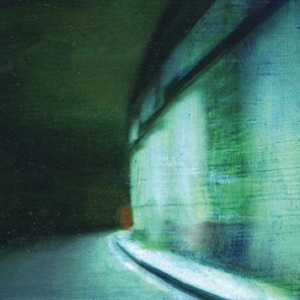Twenty years ago, filmmaker and critic Chris Petit began his first novel Robinson with a J. G. Ballard quote, "Deep assignments run through all our lives; there are no coincidences." On Museum Of Loneliness, the second spoken word LP from Test Centre, Petit re-quotes it, admitting it may have originated from an episode of Charlie’s Angels. Whatever the source, it’s a useful position from which to view the web of connections surrounding this record.
Museum Of Loneliness is Test Centre’s follow up to last year’s Iain Sinclair LP Stone Tape Shuffle. As anyone familiar with either figure will know, Petit and Sinclair are old friends and collaborators. Sinclair’s essay collection Lights Out For The Territory (1997) helped bring Petit’s name to a wider audience, even though much of his film and TV work remains unavailable. As Stone Tape Shuffle sampled the pair’s first film together, The Cardinal And The Corpse (1992), so Museum Of Loneliness samples Asylum (2000), their last. The sleeve painting by Petit’s partner and film editor Emma Matthews comes in the same blurred blues and greens as the jacket of her Sinclair collaboration White Goods (2002), while the album’s sound design is by Mordant Music, who also worked with Sinclair as part of their Travelogues download series.
The vinyl-only album splits neatly in two, as it should. Side A, ‘Dead Drunks’, finds Petit flicking through his books, the end of one novel, the beginning of another, each rustle, hesitation and cough seized upon and twisted to the fore by Mordant. Where Petit’s steady, dry narration is central to his more recent films – features that shift between documentary, biography and fiction – here he’s looser, occasionally stumbling, not quite relaxed.
The ‘Dead Drunks’ are three characters with alcohol trouble: the titular Robinson, real life spook James Jesus Angleton (The Passenger, 2006), and ex-con O’Grady (The Hard Shoulder, 2001). The forename-less Robinson and O’Grady ("My name is not Pat") represent a recurrent Petit theme: shifting identities and lack of personal definition. Think of David Beames’ DJ ‘Robert B.’ in Petit’s film debut Radio On (1979), so blank that he’s a hole at the centre of the narrative. One of the film’s strengths is there’s barely a narrative either, just a drift of music and driving in monochrome. Museum Of Loneliness is an album of drift too.
Side B is the side of images, fragments of films made and unmade. The title track sketches a placeless museum, which may be "everything or nothing": the more details and definitions Petit utters, the less solid it becomes. In its "return to underground activity, in a spirit of decommission or non-commission", it alludes to Petit’s own journey to the margins, both professionally (those BBC and Channel 4 phone calls seem to have ceased) and personally, winding up – like Sinclair and Mordant – on the Sussex coast. Where, eventually, our paths cross. There are no coincidences.
A big slab of Mordant manipulation appears, bursts of Radio On breaking in, before the concluding litany of ‘Flickers’, another list of memory bursts from the movies. And the last word, "Cut."


